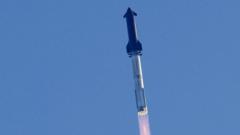The US Federal Aviation Administration (FAA) has grounded SpaceX's Starship rocket following a dramatic explosion during its latest test flight. The incident occurred after launching from Boca Chica, Texas on Thursday, resulting in the upper stage disintegrating over the Caribbean. This forced commercial airlines to reroute their flights to avoid descending debris.
The FAA is currently collaborating with SpaceX and local agencies to assess any damages reported in the Turks and Caicos Islands. Thankfully, no injuries have been reported. The aviation authority has mandated SpaceX to conduct a "mishap investigation," which will be reviewed before determining if Starship is cleared for future flights.
To ensure safety, the FAA activated a "debris response area," which temporarily affected air traffic, requiring some flights to divert due to low fuel levels after being held outside the area of falling debris.
SpaceX had targeted this particular test as the seventh mission for Starship, featuring an upgraded upper stage, now measuring two meters taller than previous iterations. The ultimate goal for the Starship rocket, which is the most powerful ever constructed, is to facilitate space exploration, including potential missions to Mars.
The rocket lifted off at 17:38 EST (22:38 GMT) and completed the upper stage separation from the Super Heavy booster successfully, but mission control later reported a loss of contact with the upper stage. While the Super Heavy booster successfully returned to the launchpad, SpaceX confirmed that the upper stage experienced a "rapid unscheduled disassembly."
Elon Musk indicated on his social media account that preliminary evaluations suggest an oxygen/fuel leak as the main issue contributing to the explosion. Despite the incident, Musk expressed optimism regarding future launches, stating that there was no indication of a delay pushing the next launch past the next month.
The overall Starship system, combining both the spacecraft and Super Heavy rocket, stands at an impressive height of 123 meters (403 feet) and is designed to be fully reusable. NASA is looking to utilize a modified version of Starship for its Artemis lunar missions, while Musk envisions longer interplanetary journeys to Mars in the future.
This test flight also coincided with the inaugural launch of the Blue Origin New Glenn rocket system, sponsored by Amazon's Jeff Bezos, as both billionaires vie for dominance in the burgeoning space vehicle sector.


















